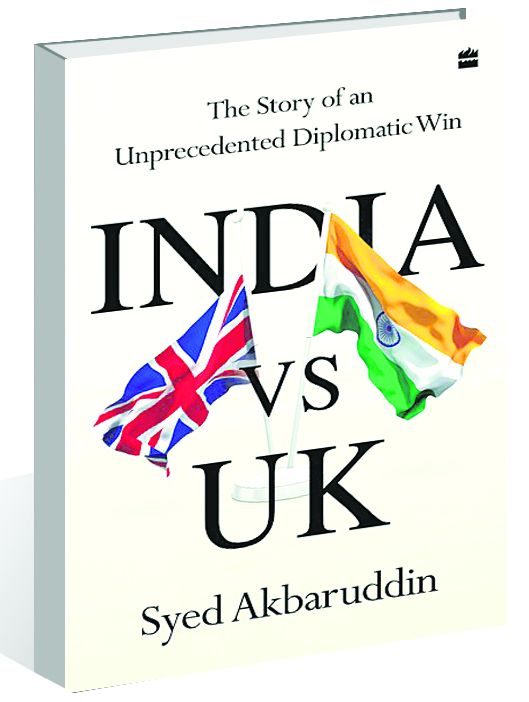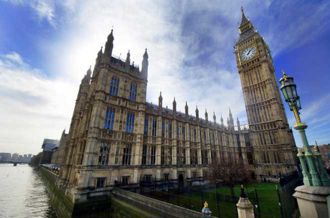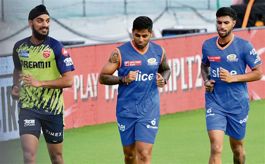India vs UK: The Story of an Unprecedented Diplomatic Win by Syed Akbaruddin. HarperCollins. Pages 240. Rs599
Book Title: India vs UK: The Story of an Unprecedented Diplomatic Win
Author: Syed Akbaruddin
Vivek Katju
Syed Akbaruddin’s ‘India vs UK’ is a principal player’s account of the 2017 United Nations election for a seat on the Bench of the International Court of Justice (ICJ). It witnessed the Indian nominee, Dalveer Bhandari, prevail over Christopher Greenwood of the United Kingdom. Never before had a non-P5 candidate succeeded against a P5 nominee in an ICJ election. That made this election, which began in the traditional mode — a six-candidate contest for five seats — unique.
Akbaruddin was India’s Permanent Representative (PR) to the UN in New York at the time. In that capacity, he led the country’s UN Mission into this epic diplomatic battle. India’s foreign policy establishment, politically led by Prime Minister Narendra Modi and External Affairs Minister the late Sushma Swaraj, and professionally by then Foreign Secretary S Jaishankar, worked flawlessly together to achieve success.
In February 2016, merely six weeks into his assignment, Akbaruddin was quietly cautioned by a West African country PR that their Lebanese colleague, Nawaf Salam, had begun to campaign for his ICJ candidacy though the election was 20 months away. The diplomat may have assumed that India would contest the election for a full term for Bhandari, its current ICJ judge, who, in keeping with convention, would be pitted against Salam. However, not only was this election not on India’s radar, there was no response to the Mission’s March 2016 reference to the Ministry of External Affairs about it for over a year.
By spring 2017, questions began to be asked within India’s ruling dispensation regarding Bhandari’s candidacy. By this time, it was really late to begin a campaign. Besides, India was focused on the victory of its nominees in elections to the International Law Commission and the International Tribunal on the Law of the Seas. These were also slated for the November 2016-17 cycle. So, Akbaruddin with the support of Sushma Swaraj pointed to the difficulties in putting up Bhandari. All this changed with the decision to take Kulbhushan Jadhav’s case to the ICJ in May 2017. Now with the importance of having a permanent Indian judge in the Court becoming clear, it was decided to nominate Bhandari.
The ICJ election is very complicated and both the UN Security Council and the General Assembly are involved. Akbaruddin explains the process succinctly. Initially, India’s chances were bleak as many countries had pledged support for others. Extensive lobbying improved Bhandari’s position. However, no clear strategy appeared in sight till a Caribbean diplomat suggested to Akbaruddin to focus on the General Assembly. He pointed to a precedent where an ICJ candidate lagged behind in the UNSC but succeeded because of far greater support in the UNGA. After detailed examination, Akbaruddin realised that the path to victory lay through the Assembly.
The handicap of the late start meant that India could not overcome the Salam challenge or the other candidates, apart from Greenwood. These four had the firm support of their groups, which voted tactically to push favourites over the finishing line and pulled down others. This resulted in four of the six being declared elected and a straight contest between India and the UK for the fifth seat.
The UK began with the advantage of precedent; its judge and of other P5 countries were virtually always on the ICJ Bench. But in the UNGA, there was a current against P5 privilege. Many looked to India to not give in or compromise. As an impasse developed — the UK had a majority in the UNSC and India increasing support in the UNGA — the British, especially with the support of the US, resorted to intrigue and undemocratic methods. When this was failing, they tried to offer a compromise. It was here that India’s leaders relied on Akbaruddin’s advice that the support in the UNGA would translate into victory.
‘India vs UK’ grips a reader as would a classic of the fictional thriller genre. And Akbaruddin covers the historic election’s phases, rules, nuances, surprises brilliantly.














